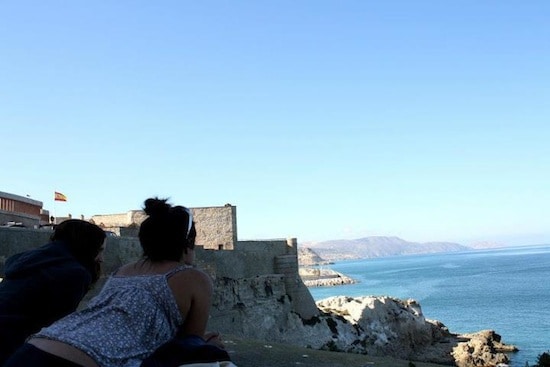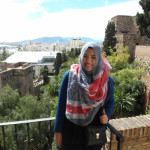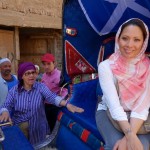From Spain to the Moroccan Border: A World Apart

Living in Melilla, a little Spanish enclave at the top of North Africa, as a British language assistant, you sort of get used to the Arabic twist on things. One of the first weeks I spent here, a fellow assistant and I decided to hop on a bus and see where it took us and after five minutes, we saw Melilla’s buildings change. The scenery altered as well as the people that occupied it; in fact, it seemed to slowly morph into a third-world city, leaving behind its mini Barcelona-like town as we got closer and closer to the border.
It was as if a black cloud hung over the end of Melilla changing the way the city looked as well as the atmosphere it portrayed, covering up the women of the town, from the girls who wore beach gear to the women who could only see out of the peepholes in their burkhas.
When we got off the bus at the border, we felt more than just culture shock. Hundreds of men sold whatever they could–fruit, vegetables, blankets, shoes, tissues, snacks, Coke… We felt lost. Men carried scraps of metal and wood–anything they found useful to take home to Morocco on their scrawny, rusty little bikes. I even saw a man carrying a washing machine while riding his bike as if it were the normal thing to do.
The ground was covered in a sheet of dust, dirt, flies and leftover fruit and vegetables from the markets. I know it doesn’t sound very appealing, but the truth of the matter is, it wasn’t. However, don’t judge a whole country by its border!
From Spain to the Moroccan Border: A World Apart.
As a woman, the experience was even more challenging. Because I was previously unaware that we were going to Africa that day, I wore what any normal Spaniard wears to the beach–which was not in keeping with Moroccan custom. People looked at me and judged me. The women at the border stared at me in disgust, as though I had no right to wear such revealing clothes. I’m not going to lie–it was humiliating. But then I thought, what gives these people the right to look at me and hassle me and make me feel self conscious. I held my head high and braved the abuse.
If you are planning to cross the border at Melilla to Nador (flights from Ryanair have just begun), I warn you that it’s not easy. But still, it’s worth going through.
On the other hand, the 6th of November was a different kettle of fish. Now getting used to the fact we lived in Spafrica we decided to hop over to Nador to get a McDonalds. (Try having tapas everyday; it does get boring!) But, we were suprised at the border–amidst the hustle and bustle of the border, peace, quiet, and tranquillity were gone as were all the people. What was going on? There were no car queue’s, merchants, hassle–nothing. Shocked, I went to take a picture at the no-man’s-land border when a policeman stopped me, exclaiming that it must be deleted and that I had to show him that I was erasing it.
As a woman, I was definitely scared at this one because it showed me how terribly others are treated in the world.
With its cage-like appearance, the ‘separation barrier’ as it’s rightly called was put up by Spain to stop illegal immigration and smuggling. However, from what I could see, it was more than just in place for protection. It was also about pride. From witnessing the way the helpless Moroccans were treated at the border, I couldn’t help but wonder why the Spanish sovereignty was so proud? It seemed like they were treating the Moroccan people like animals in a cage was inhumane.
At other border crossings, it is typical to be submerged into another world that you may not like at or that scares you. As a woman, I was definitely scared at this one because it showed me how terribly others are treated in the world.
After getting through the border crossing, we drove through Beni Enzar and down to Nador and noticed how dead the streets were. On every street corner it was as if every family had thrown out a dirty unwanted furry rug. Eventually we found an open cafe where a waiter informed us that it was, in fact, Eid, a Muslim holiday, and that those furry rugs were the skins of dead sheep. At first I was shocked. I felt like I was in a horror movie driving around a dead town with bloody animal corpses lying everywhere but then I decided to cut them some slack thinking that they, like the Spanish government, may have a method in their madness.
From Spain to the Moroccan Border: A World Apart.
It turns out that Eid celebrates how Abraham showed his love for God when he almost killed his son at God’s command. But, at the last moment, God sent him a ram to sacrifice instead, which subsequently earned him God’s trust. On the day before Eid, in order to symbolise his love for God, the man of the family kills a sheep and removes all its yucky bits until it is prepared to cook for the family. Hence the furry rugs. The day is then celebrated with prayers, special clothing and a huge feast which has also to be shared with neighbors.
In my opinion, it makes sense to do things properly if you are going to do them at all. Eid made me realize that Moroccan Muslims take their religion seriously and follow the rules according to ‘Him’. Or do they?
I am a true believer in faith as long as you stick to the rules. But what about respecting others and respecting thy neighbor? This occured to me as we were heading back to the border and a man with his covered up wife standing beside him blew me a cheeky kiss. I not only felt violated, but sad for the woman that has to live with this man for the rest of her life, sad that she has no say in the matter, and sad that she as a woman is given no respect.
I not only left Morocco that day with a loss of appetite but a loss of respect for this world that I had just come to know and understand.
It is clear that this is no third world.
It is clear that this is no third world. Instead, this is a man’s world where women have no voice. It’s a world were women not only cover up their bodies but also their self respect. But as sad as it may seem, it also made me feel empowered because I realized that we live in a world that cannot survive as a just and humane place without women. The King and his men may have won in conquering Morocco but they have failed in making it into a fair world where everyone can live in peace–which is what God wants anyway, right?
Nonetheless, don’t let this put you off going to Morocco. It is challenging place to travel to but worth it. You will see a totally different world and immerse yourself in a culture which you may not understand or believe in but that doesn’t make it incorrect. Still, I can’t help but feel sorry for the sheep!
Photo by Anna Zoe Denobriga.










Is there any way I could contact the author of this article? As I have been offered a year-long position of a language assistant and I have no idea what to expect. It would be great to find out more info on this!